When you are healthy, you don’t often find yourself thinking about your heart. Although that heart works tirelessly day in and day out, it can be easy to forget the heart is even there. It’s just an organ inside your body that you occasionally feel if you get nervous or sprint up the stairs, but it is otherwise taken for granted.
When you have a cardiac condition, however, rather than assuming your heart will work for you, you fear the day it may tire out. When you develop a heart condition, your life immediately changes—and despite medical intervention, those changes may persist. Without warning, you may find yourself isolated and confused as you battle health issues. You may suddenly experience depression, anxiety, and loneliness while recovering from a cardiac event—conditions that, regrettably, increase mortality risk during the recovery process.1,2
Rehabilitating the Mind and Soul
Wayland Moore, a world-renowned artist and survivor of triple-bypass surgery, received cardiac rehabilitation at the Emory HeartWiseSM Risk Reduction Program in Atlanta, Georgia in 2010. He was incredibly grateful for the doctors and the medical HeartWiseSM team who helped him and his peers. However, during his recovery, he felt something was missing from the process. As an artist, Moore was looking for a way to rehabilitate his mind and soul after the major medical event he had experienced, so that he could fight the depression he faced day after day. Finding no opportunities for creative exploration within his traditional medical care, he decided to create the opportunity himself.
Art With Heart
In 2010, Moore started an art class at the HeartWiseSM Risk Reduction Program to provide a new opportunity for cardiac patients. “Art with Heart” is for individuals who are in the process of or have completed cardiac rehabilitation. As the artists in his class discover their new limitations and adjusted capabilities, they also have access to a new and exciting type of rehabilitation that channels creativity and provides a fun and supportive community.
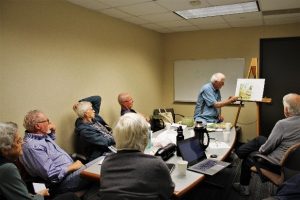
An Art with Heart class observes Wayland Moore critique one of the participant’s pieces, making suggestions for improving the perspective of the piece.
As a teacher, Moore fosters creativity and emotional growth in others who have suffered a major cardiac event. In turn, the class is a valuable continuation of his own rehabilitation. Anyone who observes the class can see that Moore enjoys helping the participants learn to intertwine art with their rehab experiences. The participants enjoy his generosity week after week, as they continue on their own paths of healing, and of self-exploration as budding artists. At this writing, the class includes 10 participants; each one smiles, laughs, and shares supportive energy peer-to-peer.
Each week prior to class, participants prepare a piece of art on any topic they find inspiring. They then share their pieces with the class and receive feedback from Moore and their peers.
Some participants had no experience with painting before their cardiac event; yet, with Moore as their guide, many have discovered a skill they never knew they had. When Norene began the class, she claimed she had no artistic talent. When Beverly began, she said she had never before picked up a paintbrush. Now, following Moore’s guidance, Norene paints book covers and Beverly designs greeting cards.
In February 2017, the entire class curated an art exhibit to present their work to the public. On opening night, the class sold 6 paintings—the proceeds of which went to benefit the artists, the class, and the cardiac rehabilitation program (HeartWiseSM) which was moved to Emory Saint Joseph’s Hospital. For the first time, the participants saw themselves as artists capable of painting something worth buying. They were able to define themselves as more than cardiac survivors; they were artists now, too.
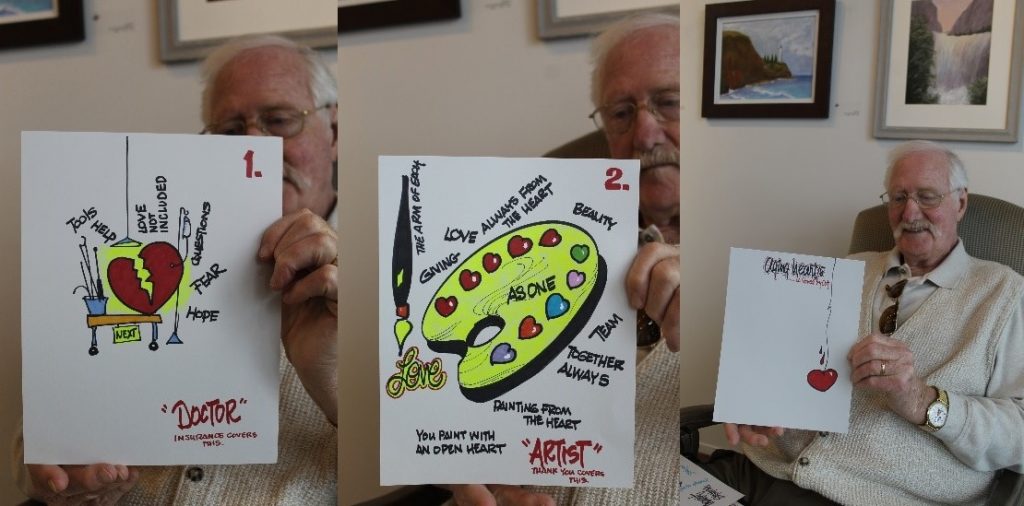
Moore explains through drawings his personal experience in cardiac rehab and the necessity of art as an outlet.
Moore has found that when patients have the opportunity to engage in art, they suddenly have the ability to replenish the “love” in their hearts. Wayland often tells the doctors at Emory Cardiology that a class like this should be required: “Art makes you feel so alive. Sure, medicine gets our hearts ticking, but what about our souls?”
A New Heart: A Personal Experience
Charlie Hoff suffered four heart attacks, and went through two angioplasties and a coronary bypass before being diagnosed with heart failure in 2010 (C. Hoff, personal interview, March 5, 2017). Soon after his diagnosis, he required an implantable cardioverter-defibrillator (ICD) for his continual ventricular tachycardia. Eventually, Hoff’s doctor suggested he be evaluated for a heart transplant. He was shocked. He found it very hard to grasp that he would get a heart that had belonged to another person. During this time, his family was in dire financial straits. The economy was bottoming out; Hoff was the director of a failing community bank. He was about to lose the family house when his doctor finally said, “We can’t wait any longer.” Hoff had to just pray that everything would fall into place.
On August 1, 2010, he was admitted to the coronary care unit (CCU) at Emory University Hospital. He was on the 3rd floor, in room 307, for 53 days while he waited for a heart. When he finally got a match and underwent surgery, his friends and family waited anxiously for good news. Three days after surgery, he woke up in the intensive care unit (ICU), and started his road to recovery.
When Hoff woke up, he could immediately feel the difference his new heart made. He had been deprived of a good supply of blood for so long that he had forgotten what “normal” felt like. Breathing was suddenly easier, he could sense the oxygen coursing through his body, and his heart felt “lighter.” He had lost 60 pounds and a tremendous amount of muscle mass through the weeks leading up to the transplant. However, he was determined to gain his life back. When Hoff was able to begin rehab, it became his full-time job. Although cardiac rehabilitation is hard work, many patients make a lot of close friends during its course. The people in the rehab gym became Hoff’s community, which he affectionately described as “his people.” One of his new friends, Jack, told him about an art class he was in with a fellow patient, Wayland Moore. When Hoff saw the sign-up sheet for the art class he thought, “You know what? I should do that.” Six years later, he cannot fathom how his life would be now without the joy of painting in it.
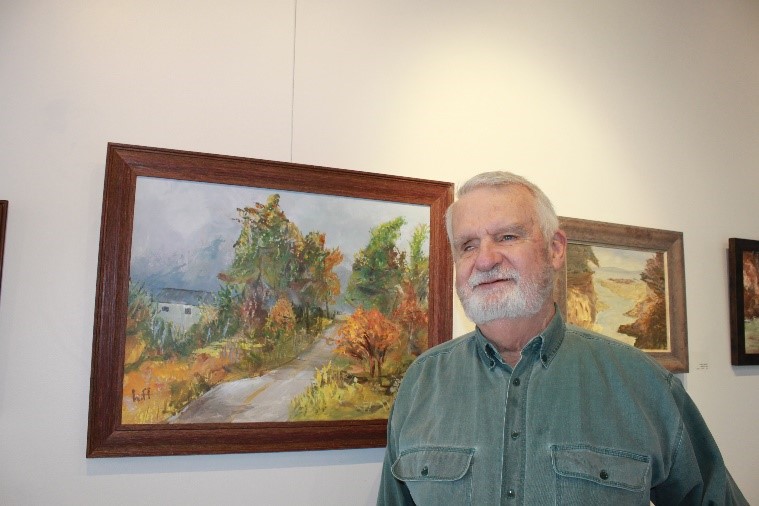
“When I got into the art program while I was doing rehab, it was a new dimension for me. It was something I could do without straining myself. It was a way to discover a whole new avenue I had never explored before. With the camaraderie and the encouragement I got, I was encouraged to see each mistake as a happy mistake. This became a way to find a whole new world out there.” – CH
When the Heart is Given a Canvas
One night, before his transplant, Charlie Hoff was at a concert with a friend and his heart pump batteries began to run low. He had to walk home and change the pack to avoid initiating an arrhythmia. He tried to explain what was going on, but his friend appeared put off by the situation. Hoff felt isolated, lonely, and depressed due to his illness and the lack of understanding from others.
In art class during his rehabilitation, however, everything felt different. Hoff was surrounded by people who understood his condition and what he had been through. They saw him as a human being rather than a diagnosis. The class served not only as a creative outlet, but also as a social network of individuals who understood the struggles he was facing.
Painting became something Hoff could do—a way he could express himself—without causing strain on his healing heart. With Moore’s instruction, the camaraderie, and the encouragement of the class, he was able to grow personally. He found himself observing things differently than he had before his surgery, as if he were preparing to paint how the clouds looked each day—how the light today compares to that of yesterday, and the colors of the trees change. The class was the new spark in Hoff’s life that had been missing, and proved to not only be a vital part of his recovery from heart surgery, but also a crucial outlet for his personal growth. On the days he wasn’t allowed to attend rehab due to infection, he could still go home and paint. He could continue to work toward a goal and achieve something beautiful, even if it wasn’t the initial goal of increasing endurance or strength. The opportunity to participate in the art class improved his confidence, boosted his mood, and increased his motivation to continue with rehab.
For Hoff, this class has not only helped increase his adherence to cardiac rehab; it has helped him thrive and find a place in a community where he feels worthy. Hoff and his fellow painters were able to attend a “support group” without any negative stigma attached.
The Cardiac Rehabilitator and the Artist
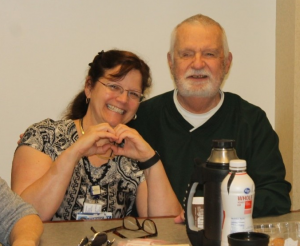
Dr. Kathy Lee Bishop and artist Charlie Hoff
Dr. Kathy Lee Bishop, former manager of the HeartWiseSM program at Emory Healthcare, worked with Charlie Hoff and Wayland Moore during their recovery. She remembers the day Moore approached her to ask if she could help him organize an art class. Dr. Bishop recalls being slightly taken aback. How could an art class fit into the cardiac rehabilitation program? Moore explained that after talking to his fellow patients, he realized many of his peers did not have much to do outside of rehab. He felt it was a disservice to his peers to let this continue. He told Dr. Bishop that he could stimulate the patients’ minds through art and provide them with a new productive pastime. Dr. Bishop reflected on the three e’s of cardiac rehab: exercise, education, and emotional support (K. Bishop, personal interview, September 8, 2017). Upon further reflection, she decided the art class fit into the “emotional” arm of the mission of cardiac rehab. She agreed that providing a creative outlet could improve participant camaraderie. A patient will only succeed with cardiac rehab if all three e’s are met; the class proved to be an exceptional supplement to ensure that each member received the emotional support they required.
Emotion: A Crucial Component of Cardiac Rehabilitation
The HeartWiseSMstaff has always strived to make the cardiac rehabilitation program patient-centered; the Art with Heart class is an extension of that goal. The emotional needs of a cardiac patient are difficult to measure, but are just as crucial to a patient’s recovery as their cardiovascular vitals. Both the HeartWiseSM program and the Art with Heart classes are two ways that physical therapists can utilize adjunct programs to address the social support and emotional needs of their patients as they go through recovery.
Providing opportunities for patients to engage in the humanities can offer essential outlets for rehabilitation of the body, mind, and soul. Researchers may soon determine that doing so is paramount to improving healthcare. At the Emory HeartWiseSM Risk Reduction Program, Art with Heart has filled the void of isolation for a small group of patients who have found that art and friendship truly fill their hearts.
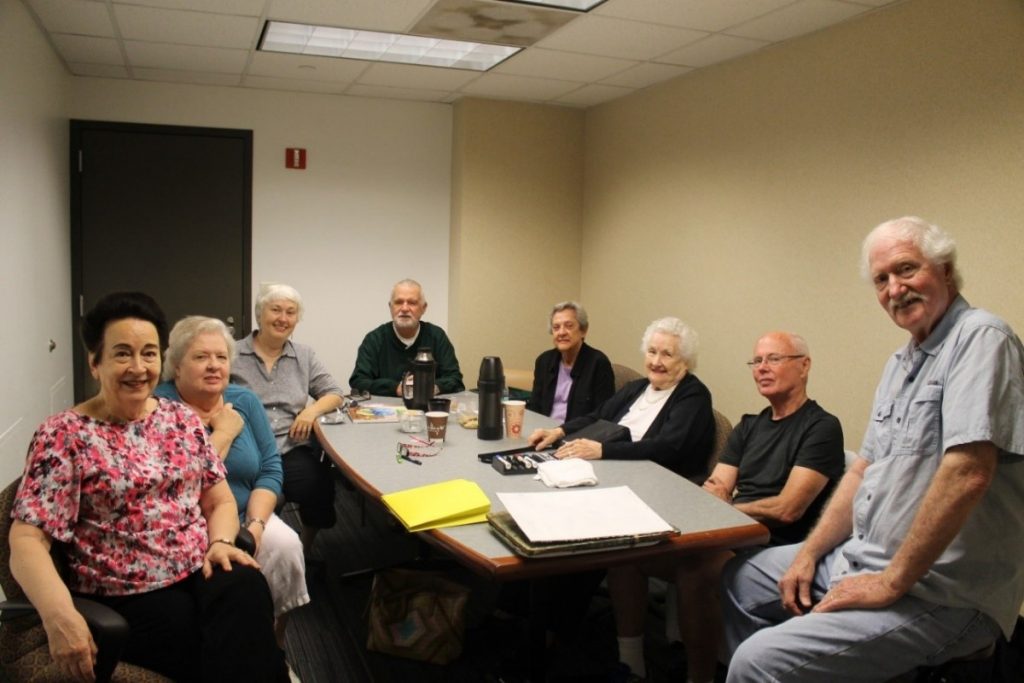
Left to Right: Beverly Donaldson, Amanda Bell, Trudi Dido, Charlie Hoff, Norene Craddick, Virginia Deadwyler, Gary Hall, Wayland Moore.
Final Thoughts
In an aging world, where experts predict that by 2050 40% of the US population will be over 65, it is increasingly important that we find ways to improve the health of the geriatric population.3 The elderly population is more likely to suffer from chronic and debilitating illnesses, including stroke, heart attack, cardiac failure, and dementia.3 While continuing to provide the best medical treatment, the medical community must begin to recognize social and emotional resources as equal components of patient-centered care.4 With reports of up to 40% of cardiac patients suffering from depression, it behooves the medical community to alter our practices to encourage personal and emotional support for our patients.1 Although physical therapists provide irreplaceable health services, providing social support and artistic outlets to encourage emotional and spiritual growth is not always a primary goal of intervention.
In order to facilitate the best possible outcomes for our patients, perhaps we should encourage the formation of special-interest groups that can provide support, encourage growth, and build confidence in times of need. As we reflect on these phenomenal aspiring artists with a need for oxygen and for living life to the fullest, I ask a simple question: What can we do to strengthen both?
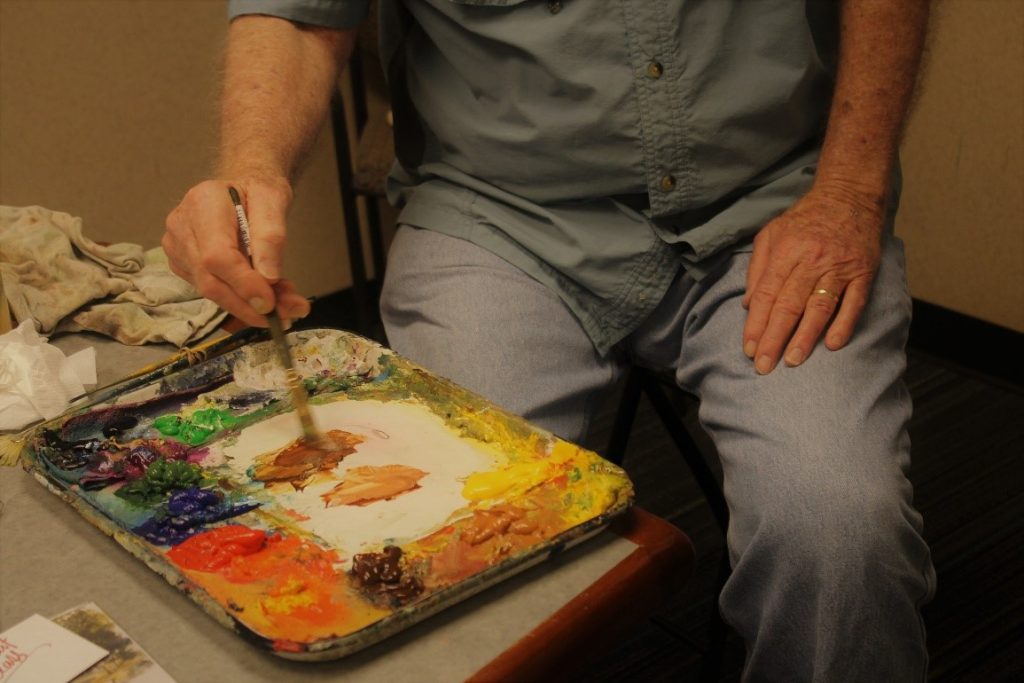
“When you paint you never use just one color. You mix a bit of brown, some purple, some white, some red… and then you get the unique shade you were looking for. Why should rehabilitation be any different?”
W. Moore, personal interview, March 5, 2017










 Member since 2019 | JM14274
Member since 2019 | JM14274


NO COMMENT